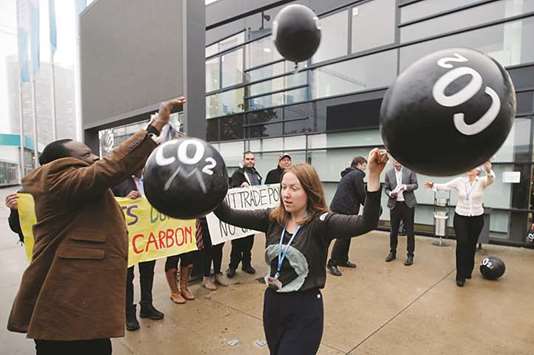President Donald Trump’s decision to withdraw the United States from the hard-fought global pact cast a long shadow over the talks, marked by revived divisions between developing countries and rich ones.
With a wary eye on America, which still has negotiators at the forum it has spurned, envoys from nearly 200 countries got on with the business of designing a “rule book” for enacting key provisions in the agreement which enters into force in just three years’ time.
“The Trump administration failed to stop the global climate talks from moving forward,” said Greenpeace observer Jens Mattias Clausen.
But it may have slowed things down.
“I have never seen a COP with so little adrenaline,” a senior European negotiator told AFP, using the shorthand for the 23rd Conference of Parties (COP 23) to the UN climate convention.
“The world is still in urgent need of action,” Clausen said. “Bonn still leaves a daunting task of concluding the Paris rule book”, which must be adopted next year.
The Paris Agreement, adopted to cheers and champagne in 2015, commits countries to limiting average global warming to under 2° Celsius (3.6° Fahrenheit) over Industrial Revolution levels, and 1.5°C if possible, to avert worst-case climate change.
Nations submitted voluntary emissions-cutting commitments to bolster the deal championed by Trump’s predecessor Barack Obama.
But scientists say current pledges place the world on course for warming of 3°C or more, and counsel urgency in reducing planet-warming greenhouse gases produced from mankind’s voracious burning of coal, oil and natural gas.
The rule book will specify how countries count and report on their promised emissions cuts.
A report this week said emissions of CO2, the main greenhouse gas, are set to rise by 2% in 2017 after three years of no growth.
“Starting now, emissions need to decrease to zero over the next 40 years to prevent us breaching the 1.5°C threshold,” Piers Forster, a professor of climate change at the University of Leeds, said yesterday.
In Bonn, negotiators gathered to work out the modalities for putting the agreement into action.
But they disagreed on key issues, not least of which the financing pledged by rich nations to help the developing world make the costly shift away from atmosphere-fouling coal, and to shore up their defences against increasingly intense superstorms, droughts, floods, and sea level increases attributed to climate change.
Yet the headline dispute at COP 23 was about coal.
On Monday, White House officials and energy company executives hosted an event on the conference margins to mount a defence of continued fossil fuel use.
This did not go down well at a forum dedicated to the drawdown of fossil fuel emissions.
On Thursday, about 20 governments from both wealthy and developing nations countered with the launch of a coal phase-out initiative – led by Canada and Britain – that also has the backing of several regional governments.
“When your closest neighbours and allies are the ones leading the global effort to phase out fossil fuel, it just shows how much Trump is out of tune with the rest of the world,” said Mohamed Adow, a climate analyst with Christian Aid, which represented the interests of poor countries at the talks.
The US is the world’s biggest historical greenhouse gas polluter, and second only to China for current-day emissions.
In spite of America’s apparent isolation in the climate forum, delegates said that not enough progress was made in the talks, and lamented the “political leadership” void left by Obama and by German Chancellor Angela Merkel, who declined to promise a coal phase out when she addressed the conference this week.
The Alliance of Small Island States (AOSIS), countries at the forefront of climate change-boosted sea level rise, put forward the “Urgency of Now Declaration” yesterday, expressing the coalition’s serious concerns about the pace of negotiations.
“While the Paris Agreement represents a remarkable diplomatic achievement, it will be judged by history as little more than words on paper if the world fails to take the level of action needed to prevent the loss of entire island nations,” said Maldives environment minister and AOSIS chairman Thoriq Ibrahim.
Union of Concerned Scientists analyst Alden Meyer said that the main dispute at the talks was about money, with developing countries demanding more certainty and transparency from rich nations on their promise to raise climate financing to $100bn (€85bn) per year by 2020.
For their part, donor nations insist on comparable obligations under the Paris pact for developing greenhouse gas polluters, who demand a certain degree of leeway.
The US, which under Trump has slashed funding for climate bodies and projects, has taken a tough stance in the finance negotiations, delegates say.

